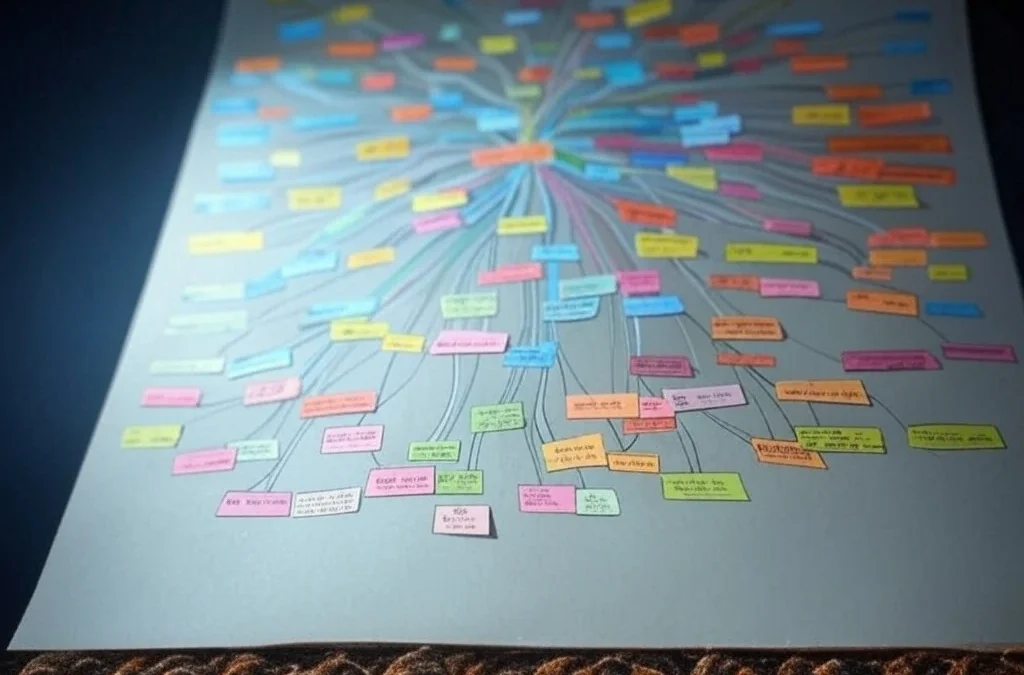Imagine you’re planning a road trip with friends. You pull out a map – or maybe just your phone – and start figuring out the best route. This is a simple example of using logic to make decisions, much like the logical systems we encounter in everything from computer science to everyday problem-solving. Logical systems help us organize thoughts, make decisions, and understand complex ideas by following a set of rules or principles. They are the backbone of how we process information and communicate effectively.
Logical systems are everywhere, even if we don’t always notice them. From the algorithms that power our favorite apps to the reasoning we use to solve puzzles, these systems guide our thinking. In this article, we’ll explore 20 different examples of logical systems that shape our world. Whether you’re interested in mathematics, technology, or just curious about how things work, understanding these systems can offer new insights into everyday life. Let’s take a closer look at how these logical frameworks influence the way we think and operate.
What Are Logical Systems?
Logical systems are structured frameworks designed to represent, analyze, and evaluate formal reasoning. These systems use a combination of symbols, rules, and principles to define valid arguments and derive conclusions from given premises. They ensure that reasoning processes are clear, consistent, and logically sound.
In disciplines such as philosophy, mathematics, computer science, and artificial intelligence, logical systems play a crucial role. They provide the foundation for constructing proofs, developing algorithms, and ensuring the correctness of software and hardware systems. For instance, propositional logic and predicate logic are two fundamental types of logical systems. Propositional logic deals with the manipulation of whole statements, while predicate logic delves deeper, analyzing the internal structure of statements using quantifiers and variables.
Logical systems are essential for problem-solving and decision-making processes, as they offer a structured approach to understanding complex scenarios. By applying logical rules, individuals and machines can deduce new information, verify the truth of statements, and resolve conflicts in data or arguments.
Overall, logical systems are indispensable tools in various fields, enabling clear and precise communication of ideas and fostering rigorous analysis of information. Understanding logical systems enhances critical thinking skills and supports the development of technologies that rely on formal reasoning.
Key Examples of Logical Systems
Logical systems are the frameworks that help us make sense of the world by following structured rules of reasoning. They are integral to fields like mathematics, computer science, and everyday problem-solving, shaping how we analyze, interpret, and interact with information. Below, we explore key examples of these systems that influence everything from technology to critical thinking.
1. Mathematical Logic
Mathematical logic forms the foundation of logical systems by using symbols and formal rules to represent and analyze mathematical statements. It includes areas like set theory, proof theory, and model theory. This system helps ensure that mathematical proofs are valid and that theorems are logically sound.
2. Boolean Algebra
Boolean algebra is a branch of algebra that deals with true and false values, often represented as 1 and 0. It is fundamental in computer science for designing circuits and programming. Logical operations such as AND, OR, and NOT are used to manipulate these binary values, forming the basis of digital logic.
3. Propositional Logic
Propositional logic involves the study of propositions and their relationships through logical connectives. Propositions are statements that can be either true or false. By combining these statements with logical operators, complex arguments can be simplified and evaluated for truthfulness.
4. Predicate Logic
Predicate logic expands on propositional logic by incorporating variables and quantifiers. This allows for more detailed expressions about objects and their properties. It is essential in fields such as linguistics and computer science, enabling the formation of more expressive logical statements.
5. Fuzzy Logic
Fuzzy logic handles reasoning that is approximate rather than fixed and exact. Unlike traditional binary logic, fuzzy logic allows for degrees of truth. This system is particularly useful in control systems and artificial intelligence, where binary distinctions are too limiting.
6. Modal Logic
Modal logic introduces modalities, such as necessity and possibility, into logical systems. It is used to reason about statements like “necessarily true” or “possibly true.” This type of logic is valuable in philosophy and computer science, especially in areas dealing with knowledge and belief.
7. Temporal Logic
Temporal logic focuses on the ordering of events in time. It is crucial for reasoning about sequences of events in systems, such as in the verification of computer programs and digital circuits. Temporal logic helps ensure that events occur in the correct order and within specified time frames.
8. Deontic Logic
Deontic logic deals with concepts of obligation, permission, and related norms. It is used in ethical and legal reasoning to formalize rules and regulations. This logical system helps clarify what actions are obligatory, permissible, or forbidden.
9. Description Logic
Description logic is used to represent and reason about the knowledge of an application domain. It serves as the foundation for ontologies in artificial intelligence and semantic web technologies. Description logic allows for the classification and inference of relationships between concepts.
10. Non-monotonic Logic
Non-monotonic logic allows for the introduction of new information that can change previous conclusions. Unlike traditional logic systems, where conclusions are fixed once reached, non-monotonic logic models real-world reasoning more closely. It is particularly useful in artificial intelligence for dealing with incomplete or evolving information.
11. Game Theory Logic
Game theory logic is a framework for understanding strategic interactions among rational decision-makers. It uses mathematical models to analyze how players make decisions in competitive situations, where the outcome depends on the actions of all involved. This logic is essential in economics, political science, and psychology for predicting behavior in situations like market competition or negotiation.
12. Default Logic
Default logic is used to reason with commonly accepted assumptions, allowing conclusions to be drawn in the absence of complete information. It is particularly useful in artificial intelligence, where systems need to make reasonable assumptions in uncertain environments. Default logic helps automate decision-making processes by providing a way to infer plausible conclusions from incomplete data sets.
13. Epistemic Logic
Epistemic logic focuses on reasoning about knowledge and belief. It provides tools to express and analyze what agents know or believe, including how these states change over time. This type of logic is crucial in fields like computer science and philosophy, where understanding the dynamics of knowledge and belief is essential for modeling intelligent agents.
14. Paraconsistent Logic
Paraconsistent logic allows for handling contradictions without descending into triviality, where anything can be proven. In traditional logic, contradictions lead to logical explosion, but paraconsistent systems manage inconsistencies gracefully. This logic is applied in areas where data may be inconsistent, such as legal reasoning or complex data integration tasks.
15. Dynamic Logic
Dynamic logic is used to reason about computer programs and their execution. It extends classical logic by introducing modalities that describe the possible states of a program before and after execution. This logic is vital in computer science for verifying the correctness of software and ensuring that programs behave as intended.
16. Argumentation Frameworks
Argumentation frameworks provide a structure for analyzing and evaluating arguments in a formal way. They model how arguments support or contradict each other, facilitating the resolution of conflicts and the identification of valid conclusions. This approach is valuable in fields like law and artificial intelligence, where complex argumentation and decision-making processes are common.
17. Belief Revision Logic
Belief revision logic addresses how an agent should change its beliefs in light of new evidence. It provides formal methods for updating belief systems while maintaining consistency. This logic is particularly important in artificial intelligence, where systems must adapt to new information continuously, ensuring that their knowledge remains accurate and reliable.
18. Conditional Logic
Conditional logic deals with “if-then” statements, exploring the implications of hypothetical situations. It is used to model conditional reasoning, which is fundamental in everyday decision-making and scientific theorizing. This logic helps in understanding causality and making predictions based on given conditions.
19. Probabilistic Logic
Probabilistic logic combines probability theory with traditional logic to handle uncertainty in reasoning. It allows for the expression of likelihoods and probabilities, offering a nuanced approach to decision-making where outcomes are not deterministic. This logic finds applications in fields like machine learning and risk assessment, where uncertainty is inherent.
20. Intuitionistic Logic
Intuitionistic logic rejects the law of the excluded middle, which states that every proposition is either true or false. Instead, it focuses on constructive proof, where the existence of a mathematical object is demonstrated by constructing it explicitly. This logic is influential in areas like computer science and mathematics, where constructive methods are preferred for their clarity and rigor.
Importance of Consistency in Logical Systems
Consistency is a cornerstone in the realm of logical systems, ensuring that conclusions drawn are reliable and sound. At its core, consistency means that a set of statements or propositions do not contradict each other. This might sound straightforward, but maintaining consistency can be quite challenging, especially as logical systems grow in complexity.
Consider mathematics, where consistency ensures that the same rules apply universally, enabling mathematicians to build upon established theorems without fear of contradiction. For instance, if a system of arithmetic were inconsistent, a simple calculation like 2+2 could yield different results depending on the context, which would be chaotic.
In the realm of computer science, consistency is crucial for database management. An inconsistent database might store conflicting information, leading to errors in data retrieval and processing. This is why robust systems incorporate consistency checks and balances to maintain data integrity.
Logic in philosophy also hinges on consistency. Philosophers use logical systems to construct arguments and derive truths. If their foundational principles were inconsistent, the entire philosophical argument could collapse.
Thus, understanding and ensuring consistency in logical systems is vital across various fields. It allows for the creation of frameworks where logical reasoning can be applied effectively, providing clarity and reliability in problem-solving. This consistency is what ultimately underpins the trust we place in logical systems, whether they are used in scientific research, technological development, or everyday decision-making.
Understanding Formal Logic Systems
Formal logic systems are foundational in the study of logic and mathematics. These systems consist of a set of symbols and rules used to construct logical statements and proofs. At the heart of formal logic is the concept of a “formal language”, which is a set of strings of symbols that are constructed based on specific syntactic rules. These languages are crucial because they allow for the precise and unambiguous representation of logical propositions.
One of the most widely recognized formal logic systems is propositional logic. In propositional logic, statements are formed using propositions and logical connectives such as AND, OR, and NOT. Each proposition can either be true or false, and complex statements are evaluated based on the truth values of their components. Propositional logic is valuable for its simplicity and is often used in computer science, particularly in the field of artificial intelligence.
Another important formal logic system is predicate logic, also known as first-order logic. Predicate logic extends propositional logic by including quantifiers and predicates, which allows for more expressive statements that can include variables and relations. This system is powerful enough to express a wide range of mathematical concepts and is essential for formalizing mathematical proofs and reasoning.
Understanding these formal logic systems is crucial for anyone interested in the theory of computation, mathematics, or philosophy. They form the basis for more advanced logical systems and are instrumental in various applications, from designing algorithms to developing software that requires rigorous logical reasoning.
Applications of Logical Systems in Computer Science
Logical systems are fundamental in computer science, forming the backbone of programming languages and algorithms. They provide a structured way to represent and manipulate information. One of the most significant applications is in the design of compilers, which translate high-level programming languages into machine code. Compilers use logic to ensure that the syntax and semantics of the source code are maintained during translation. This process is crucial for creating efficient and error-free software.
Moreover, logical systems are essential in artificial intelligence and machine learning. These systems help AI models to reason, make decisions, and learn from data. Logic programming languages, like Prolog, are used in AI to solve complex problems that require logical reasoning. This makes logical systems indispensable in developing intelligent systems capable of performing tasks that typically require human intelligence.
In addition, logical systems play a role in database management. They help in formulating queries that retrieve data efficiently and accurately. SQL, a standard language for managing databases, relies heavily on logical operators to filter and sort data. This application of logical systems ensures that businesses can access the information they need quickly and reliably.
While logical systems are often associated with theoretical concepts, their practical applications in computer science are immense and varied. They are the silent engines driving many of the technologies we use daily.
The History and Evolution of Logical Systems
Logical systems have a long and fascinating history that stretches back thousands of years. They began as tools to help humans make sense of the world and solve problems systematically. Ancient philosophers, mathematicians, and scholars laid the groundwork for the logical systems we rely on today, showing how timeless the need for structured reasoning truly is.
The story starts in ancient Greece with Aristotle, often called the “father of logic.” He introduced the concept of syllogisms—logical arguments where conclusions follow from two premises. For example, “All humans are mortal. Socrates is human. Therefore, Socrates is mortal.” This structured way of thinking was revolutionary at the time and became a cornerstone of Western philosophy.
Centuries later, the Middle Ages saw the rise of Scholasticism, where thinkers like Thomas Aquinas built on Aristotle’s work. They used logic to explore theology and natural philosophy, applying structured reasoning to complex, abstract ideas. Logic was no longer just a tool for debate; it became a method to uncover truths about the universe.
The next leap forward came in the 19th century with George Boole and his development of Boolean algebra. This was a new kind of logic that used symbols to represent true or false values, paving the way for modern computing. Boole’s ideas helped formalize logic, turning it into a precise and practical tool.
In the 20th century, logic took another major step with the rise of formal logic and its integration into mathematics and computer science. Mathematicians like Kurt Gödel and Alan Turing expanded the boundaries of what logical systems could do. Gödel’s incompleteness theorems challenged assumptions about the limits of logic, while Turing laid the groundwork for the computer age by using logical systems to describe how machines could process information.
Today, logical systems are everywhere, from the algorithms that power search engines to the artificial intelligence tools we use daily. But their roots remain in those early attempts to understand the world. When we think about how far we’ve come—from Aristotle’s simple syllogisms to the complex, dynamic systems used in technology—it’s a reminder of the human drive to reason, innovate, and solve problems.
Logical Systems in Philosophy and Critical Thinking
Logical systems are not just for mathematicians or computer scientists; they have deep roots in philosophy. Philosophers use logic to analyze arguments and assess their validity. This practice dates back to ancient Greece, with Aristotle’s development of syllogism. A syllogism is a form of reasoning where a conclusion is drawn from two given or assumed propositions (premises). It’s a simple yet powerful tool for logical reasoning.
In modern times, logical systems are crucial for critical thinking. They help individuals evaluate arguments, identify fallacies, and construct coherent arguments of their own. This skill is valuable in everyday life and professional settings, where effective communication and decision-making are essential.
Logical systems also influence ethical reasoning. They provide a framework for evaluating moral arguments and making ethical decisions. By applying logical principles, individuals can navigate complex moral dilemmas and arrive at reasoned conclusions. This application of logic is particularly important in fields like law and medicine, where ethical considerations are paramount.
Teaching logic in educational settings can enhance students’ critical thinking skills. It encourages them to question assumptions, analyze information, and develop reasoned arguments. This not only benefits their academic pursuits but also prepares them for the challenges of the real world.
In conclusion, logical systems are a vital component of philosophy and critical thinking, offering tools that help us navigate the complexities of human thought and interaction.
Read also: 20 Resurgence Examples & Definition
The Most Popular on BitGlint

Hermaphroditus (Greek Mythology)
In Greek mythology, Hermaphroditus was born as the son of Hermes, the messenger god, and Aphrodite, the goddess of...

50 Contrast Examples in Life, Art & Literature
We notice contrast all the time, even if we don’t think about it. It's there when the sky shifts from light to dark....

30 Rigidity Examples & What It Really Means
Rigidity affects many aspects of our lives, from physical structures to personal behaviors and organizational systems....

30 Examples of Rebirth: Definition & Meaning
Rebirth represents one of the most powerful concepts in human experience - the process of starting anew after an...

50 Intellectual Challenge Examples
Intellectual challenges serve as excellent tools for mental stimulation, cognitive development, and continuous...

30 Oversimplification Examples & What it Means
Oversimplification is everywhere. You've probably encountered it many times - on social media, in casual...

30 Divergent Thinking Examples & Definition
Divergent thinking is a powerful mental process that allows us to generate multiple solutions to a single problem....
Get Inspired with BitGlint
The Latest
30 Wishful Thinking Examples & Meaning
Wishful thinking is something we all do at some point. You hope things will turn out fine—even if there’s no real reason to believe they will. Maybe you tell yourself everything will somehow work out, even though you’ve done nothing to change the situation. It feels...

50 Things That Oscillate – Oscillation Explained
Oscillation is everywhere around us, whether we realize it or not. From the gentle swing of a playground swing to the tiny vibrations inside an atom, oscillations are a natural part of how the world works. Understanding what oscillation is—and seeing examples of it in...
30 Cynicism Examples in Everyday Life & Definition
Cynicism is something most people have seen, heard, or even felt - but few stop to really think about what it means. It shows up in jokes, in conversations, and in quiet thoughts we don’t always say out loud. Some people wear it like armor. Others see it as honesty....
40 Social Dilemma Examples in the World & Real Life
Social dilemmas are everywhere. They shape the choices we make at work, in our communities, and even on a global scale. These dilemmas happen when what benefits an individual might hurt the larger group. When too many people act in self-interest, it can lead to bigger...

